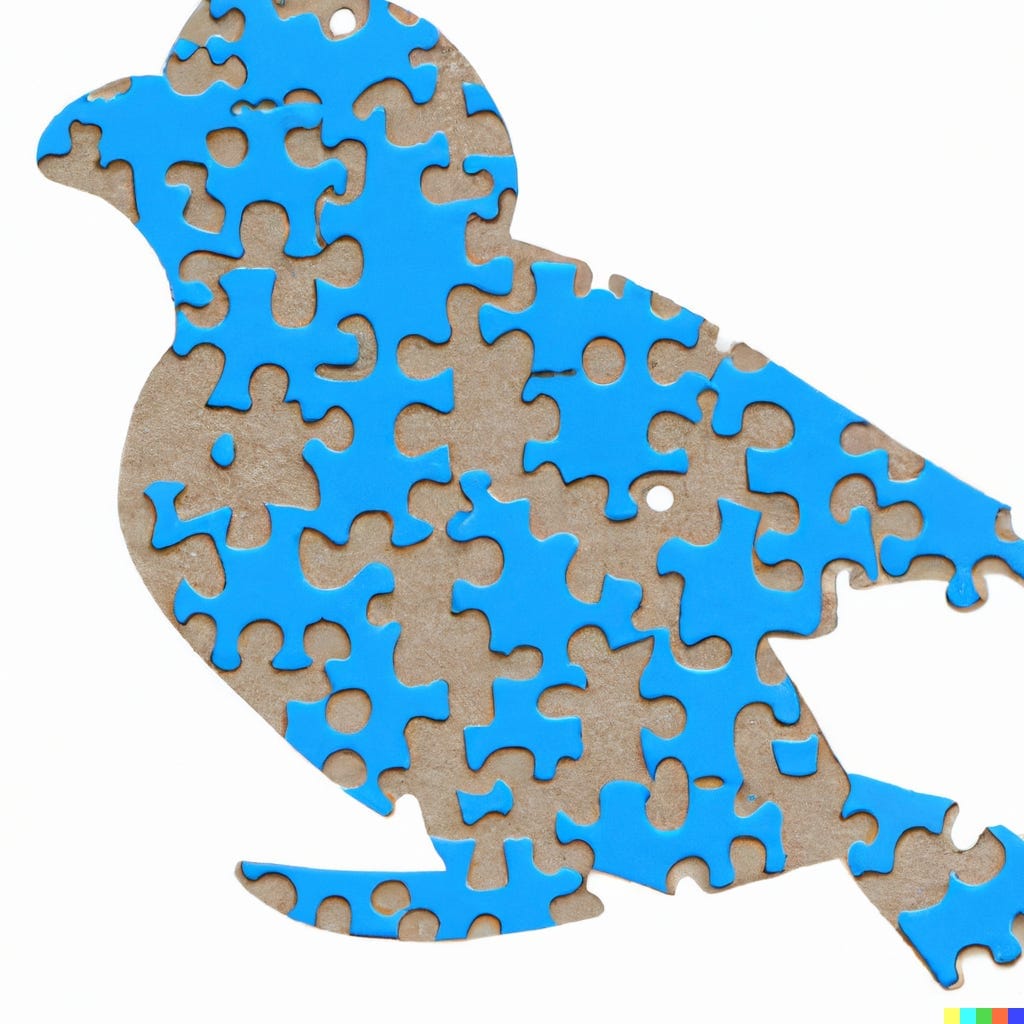New cracks emerge in Elon Musk's Twitter
Jira went down, Slack's gone, and site performance is degraded. What's next?

Today, let’s check in on Elon Musk’s Twitter, where sudden software outages and another dubious transparency effort have left the company’s remaining workers more beleaguered than usual.
On Wednesday, Twitter employees had the tech equivalent of a snow day: the company’s Slack instance was down for “routine maintenance,” they were told, and the company was implementing a deployment freeze as a result.
That same day, Jira – a tool Twitter uses to track everything from progress on feature updates to regulatory compliance – also stopped working. With no way to chat and no code to ship, most engineers took the day off.
Jira access was restored on Thursday. But Platformer can now confirm that Slack wasn’t down for “routine maintenance.” “There is no such thing as routine maintenance. That’s bullshit,” a current Slack employee told us.
In this as in so many other things, Twitter hasn’t paid its Slack bill. But that’s not why Slack went down: someone at Twitter manually shut off access, we’re told. Platformer was not able to learn the reason prior to publication, though the move suggests Musk may have turned against the communication app — or at least wants to see if Twitter can run without Slack and the expenses associated with it. (Musk’s Tesla uses a Slack competitor called Mattermost for in-house collaboration, and Microsoft Outlook and Teams for email and meetings.)
On Blind, the anonymous workplace chat app, the disappearance of such critical tools was met with a mixture of disbelief, frustration, and (to a lesser extent) glee.
“We didn't pay our Slack bill,” one employee wrote. “Now everyone is barely working. Penny wise, pound foolish.”
Another worker called the disappearance of Slack the “proverbial final straw.”
“Oddly enough, it's the Slack deactivation that has pushed me to finally start applying to get out,” they wrote.
For Twitter employees, Slack is more than a way to message colleagues: it’s also a store of institutional memory, preserved in documents that workers have had to rely on more and more since Musk purged thousands of employees since taking over.
“After everyone was gone, I had no one to ask questions when stuck,” an employee who stayed on past the first round of layoffs wrote in Blind. “I used to search for the error [messages] on Slack and got help 99 percent of the time.”
Slack remained down at the company on Thursday. While some employees communicated over email, others essentially took a second day off.
There’s never a good time for a company to lose its primary communication infrastructure. But the loss of Slack is likely to be particularly stressful for employees working on Musk’s latest big idea: open-sourcing the algorithm that ranks tweets in the timeline.
On Monday, Musk announced (by replying to a random account, naturally) that Twitter plans to open source its algorithm next week. “Prepare to be disappointed at first when our algorithm is made open source next week, but it will improve rapidly!” he wrote.
It’s unclear whether Twitter will actually hit that deadline — Musk seems to announce a new thing coming “next week” all the time, and often those deadlines pass and whatever feature was allegedly coming is never heard of again. (Remember the feature that would tell you if you’re shadowbanned? Or improvements to the search function? Or the content moderation council? Or letting creators charge for video?)
Still, we’re told that some engineers have been tasked with cleaning up the recommendation algorithm in preparation for making it open source. But among employees, many doubt that Musk plans to release the actual code that is currently in production — raising the question of what, if anything, he actually plans to show.
Another of Musk’s ongoing projects is to improve Twitter’s performance. At the end of last year, he claimed progress. “Significant backend server architecture changes rolled out,” he tweeted on December 28. “Twitter should feel faster.”
In fact, publicly available data indicates that Twitter has been slowly degrading since that month, when it shut down its Sacramento data center. The information comes from Singlepane, a startup whose tool measures latency issues using external signals; the company has been actively monitoring what it describes as a degradation in Twitter’s quality of service.
According to the company’s data, Twitter has seen increased latency — the time between taking an action like refreshing the timeline and seeing new tweets populate in your feed — during times when more people are using the service. Singlepane showed latency spikes during the halftime show of the Super Bowl, for example, and in the aftermath of the recent earthquake in Turkey.
We ran the data by current Twitter engineers, who say it tracks with what they’re seeing internally.
But it’s not only big external events that can cause the platform to become slower or less stable. When a user takes their account private, Twitter’s systems have to go through every single tweet in the account’s history and mark them as private, before making those tweets visible to the private account’s followers.
That can be a data-intensive request for a large account a big lift – like, say, Elon Musk’s. Singlepane’s data show that Twitter experienced significant latency issues when Musk took his account private in early February, as part of his effort to understand why fewer people have been liking his tweets lately. (He figured out a separate fix for that problem just a few days later.)
On top of all the other news, parts of Asia experienced a roughly 20 minute Twitter outage today, we’re told.

Coming Friday morning on the podcast: Reddit CEO Steve Huffman joins to talk about how the internet could change for the worse if the Supreme Court rules for the plaintiffs in Gonzalez vs. Google. Plus: Kevin reflects on getting Sydney killed, and Meta’s push into paid verification.
Apple | Spotify | Stitcher | Amazon | Google
Governing
- The US Supreme Court heard oral arguments in Twitter v. Taamneh, and appears unlikely to hand down a sweeping ruling about liability for terrorist content on social media. Fingers crossed. (Brian Fung, Tierney Sneed and Aditi Sangal / CNN)
- The US Copyright Office said AI-generated images that were created using Midjourney should not have been granted copyright protection. (Blake Brittain / Reuters)
- The Department of Justice is inching toward a lawsuit challenging Google’s dominant position in the market for digital maps and location information. (Josh Sisco / Politico)
- The FTC won’t challenge Amazon’s $3.49 billion acquisition of One Medical parent company 1Life Healthcare, and the deal will close later this week. (Leah Nylen / Bloomberg)
- Federal officials are charging FTX founder Sam Bankman-Fried with bank fraud and operating an unlicensed money transmitter in addition to the eight counts he already faced. (Nikhilesh De, Jack Schickler, Sandali Handagama / CoinDesk)
- The US Supreme Court declined to hear a bid from Wikipedia to resurrect its lawsuit against the National Security Agency challenging mass online surveillance. (Andrew Chung / Reuters)
- For all his talk about transparency, Elon Musk hasn’t published a Twitter transparency report detailing government content removal demands. (Adam Rawnsley / Rolling Stone)
- The European Commission banned TikTok on government employee devices. (Luca Bertuzzi / Euractiv)
- A shadowy cybersecurity company called S2T Unlocking Cyberspace is marketing its services, which include accessing someone’s phone and turning on their camera without their knowledge, for use against journalists and activists. (Phineas Rueckert / Forbidden Stories)
- Chinese regulators told major Chinese tech companies they can’t offer ChatGPT services to the public. (Cissy Zhou / Nikkei)
Industry
- Microsoft rolled out new safety measures for Bing that ends chats if prompted to talk about “feelings” or “Sydney.” (Davey Alba / Bloomberg)
- Microsoft just expanded access to the new Bing on Android, iOS, Edge mobile, and Skype. (Sean Endicott / Windows Central)
- Microsoft has been secretly testing its Bing chatbot “Sydney” for years. (Tom Warren / The Verge)
- Microsoft Edge is running an aggressive ad on the Chrome download page to dissuade people from switching. (Abner Li / 9To5Google)
- TikTok stars are accusing Carter Agency, a talent agency for TikTok creators, of withholding money and concealing the rates of brand deals. (Madison Malone Kircher / New York Times)
- Elon Musk laid off dozens of Twitter employees across sales and engineering last week, after telling people repeatedly layoffs were done. (Alex Heath / The Verge)
- Russian propagandists are using Twitter’s new paid verification system to appear more prominently on the platform. Who could have predicted! (Joseph Menn / Washington Post)
- Meta is planning more layoffs and will push some leaders into lower-level roles to flatten the layers of management. (Naomi Nix / Washington Post)
- WhatsApp appears to be working on a “private newsletter tool.” (Manish Singh / TechCrunch)
- Artifact, the personalized news reader built by Instagram’s co-founders, is officially open to the public. (Sarah Perez / TechCrunch)
- Google is asking some employees to share desks and alternate days in the office, citing “real estate efficiency.” (Jennifer Elias / CNBC)
- YouTube Music released a new feature to allow users to create custom radio stations with up to 30 artists. (Igor Bonifacic / Engadget)
- YouTube is rolling out access to multi-language audio tracks to more creators, allowing them to add dubbing to videos. (Todd Spangler / Variety)
- Spotify announced a new AI feature called “DJ” that will deliver a curated selection of music alongside AI-powered commentary using a “stunningly realistic voice.” (Sarah Perez / TechCrunch)
- Social media is a major cause of depression and anxiety in teen girls, according to an analysis of major studies. (Jonathan Haidt / After Babel)
- Ben Rubin, the founder of Meerkat and Houseparty, launched a new project called Towns — a protocol and decentralized chat app designed to facilitate self-owned, self-governed online communities. (Taylor Hatmaker / TechCrunch)
Those good tweets
For more good tweets every day, follow Casey’s Instagram stories.
honestly i'm embarrassed to even say i love my 3-year-old son because of how insufferable i find his fanbase (friends from daycare)
— Paint (@Roach_Collector) 1:35 AM ∙ Feb 23, 2023
A kid in the Dallas airport tapped me on the leg while we waited in a line, then whispered: “Hey! Guess what. My dad’s jet ski sank in a lake and WE NEVER SAW HIM AGAIN.”
— Matt Bell (@mdbell79) 8:56 PM ∙ Feb 22, 2023
Kid’s mom: “STOP TELLING PEOPLE THAT!”
My phone
— max (derogatory) (@maxafrass) 7:50 PM ∙ Feb 21, 2023
On my way to serve some community service time …..DONT COMMIT CRIMES!
— Cardi B (@iamcardib) 6:37 PM ∙ Feb 22, 2023
Talk to us
Send us tips, comments, questions, and Slack payments: casey@platformer.news and zoe@platformer.news.






